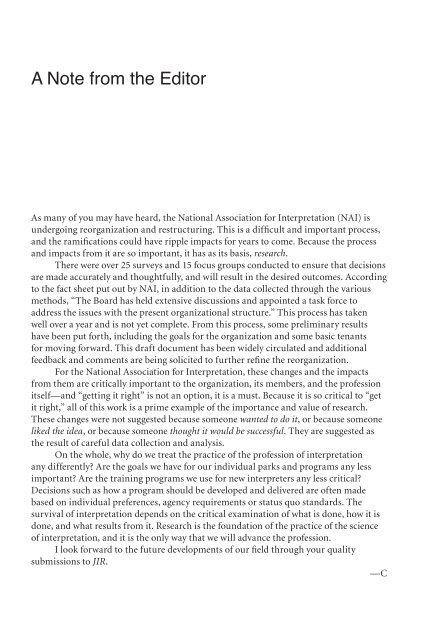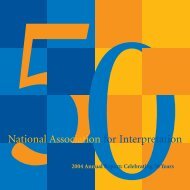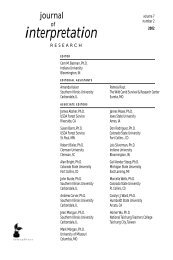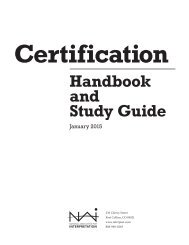interpretation
Volume 15, Number 1 - National Association for Interpretation
Volume 15, Number 1 - National Association for Interpretation
Create successful ePaper yourself
Turn your PDF publications into a flip-book with our unique Google optimized e-Paper software.
A Note from the Editor<br />
As many of you may have heard, the National Association for Interpretation (NAI) is<br />
undergoing reorganization and restructuring. This is a difficult and important process,<br />
and the ramifications could have ripple impacts for years to come. Because the process<br />
and impacts from it are so important, it has as its basis, research.<br />
There were over 25 surveys and 15 focus groups conducted to ensure that decisions<br />
are made accurately and thoughtfully, and will result in the desired outcomes. According<br />
to the fact sheet put out by NAI, in addition to the data collected through the various<br />
methods, “The Board has held extensive discussions and appointed a task force to<br />
address the issues with the present organizational structure.” This process has taken<br />
well over a year and is not yet complete. From this process, some preliminary results<br />
have been put forth, including the goals for the organization and some basic tenants<br />
for moving forward. This draft document has been widely circulated and additional<br />
feedback and comments are being solicited to further refine the reorganization.<br />
For the National Association for Interpretation, these changes and the impacts<br />
from them are critically important to the organization, its members, and the profession<br />
itself—and “getting it right” is not an option, it is a must. Because it is so critical to “get<br />
it right,” all of this work is a prime example of the importance and value of research.<br />
These changes were not suggested because someone wanted to do it, or because someone<br />
liked the idea, or because someone thought it would be successful. They are suggested as<br />
the result of careful data collection and analysis.<br />
On the whole, why do we treat the practice of the profession of <strong>interpretation</strong><br />
any differently? Are the goals we have for our individual parks and programs any less<br />
important? Are the training programs we use for new interpreters any less critical?<br />
Decisions such as how a program should be developed and delivered are often made<br />
based on individual preferences, agency requirements or status quo standards. The<br />
survival of <strong>interpretation</strong> depends on the critical examination of what is done, how it is<br />
done, and what results from it. Research is the foundation of the practice of the science<br />
of <strong>interpretation</strong>, and it is the only way that we will advance the profession.<br />
I look forward to the future developments of our field through your quality<br />
submissions to JIR.<br />
—C












